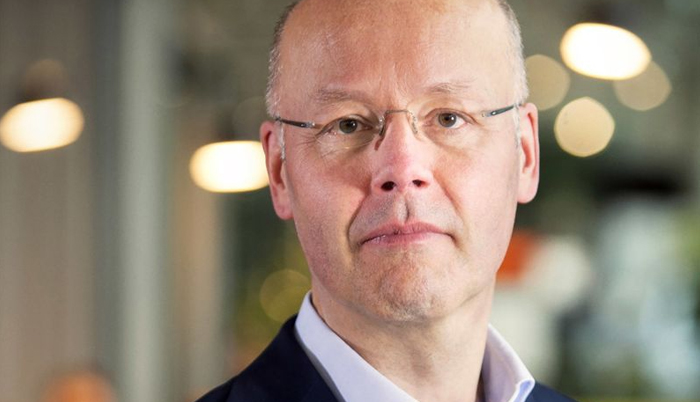![]() Home > World Business
Home > World Business
Ethical Debt Pioneer Says Transparency Will Fuel Market Growth

Roland MeesSource: ING
![]() July 2nd, 2022 | 16:25 PM |
July 2nd, 2022 | 16:25 PM | ![]() 378 views
378 views
UNITED STATES AMERICA
Five years ago, Roland Mees helped a Dutch health technology firm issue the first loan linking borrowing costs to environmental, social and governance targets.
So-called sustainability-linked loans have boomed since then and been adopted by hundreds of companies worldwide in more than $1 trillion worth of debt facilities.
Bloomberg News speaks to the pioneer of the sustainability-linked structure to find out why it’s become so popular and how regulation will boost transparency.
Mees, director of sustainable finance at ING Wholesale Banking, holds a PhD in practical philosophy and ethics. He studied the psychological and motivational difficulties of implementing sustainability practices in his dissertation.
This interview has been condensed and edited for clarity.
BN: How do you feel about the structure’s popularity? Did you think it would spread to other financial products and have a worldwide adoption?
RM: I was like ‘Woah.’ I could not have imagined the effect. It’s almost a movement that’s bigger than I expected.
BN: Why only now do we see progress in the financial market for sustainability action?
RM: We have known for a very long time that we should act responsibly. We had discussions with clients and colleagues and the main obstacle was, ‘What’s in it for me?’ There is this psychological need to justify why we should act -- why is it good for the borrowers or lenders? In addition, we see companies acting as a result of pressure from different stakeholders, of which the regulator is the most significant driver.
BN: How did you overcome that obstacle?
RM: It has two elements. Fortunately, companies which have good ESG ratings generally have better credit ratings, and that’s our economic argument. This economic justification is also good for the banks and their shareholders. Everyone needs a push to the right direction, and this economic justification is the extra motivation. Then, there is the behavioral element. People don’t generally act until there’s a push from authorities or an incentive.
BN: Were there any rejections?
RM: Not from the first clients we spoke to about this or internally as they understood and liked the concept from the start. However, not all pitches to clients were (and are) successful because the common responses were, ‘We’re not ready yet, or not advanced enough. Maybe not now, maybe later.’ Not all companies have such maturity in sustainability or ESG.
BN: Why link the deals to interest rates?
RM: The discount and premium are nudges, as proven in psychology research that large groups of people will mainly act if they are given some incentives. Behavioral science plays a role here.
BN: So, what’s in it for the banks?
RM: Apart from the fact sustainability is strategically important to ING, sustainable companies are more likely to do better which reduces the credit risks in our own book. Large companies choose their banks, and there’s a lot of competition. However, borrowers increasingly prefer banks to have strong ESG credentials.
BN: What needs to be done or what improvements do we need to see further growth of the market?
RM: The sustainability-linked label might become regulated in future. Regulation will be helpful for both transparency and moving the market into the direction of meeting the goals of a net-zero society.
There will be more transparency everyday, as we see in most of the sustainability-linked transactions in the German Schuldschein market for example. We will get there as the market evolves and transparency will be enforced eventually. There will be rules for everyone, at least from the European Union, and even Asia could mirror the EU taxonomy.
It’s also important the market adheres to high quality standards, as we have written about in our position paper on the credibility of the sustainability-linked loan and bond markets.
BN: Do you feel that goals should include at least one social or governance target?
RM: I definitely think that there should be a mix of E, S, and G targets. If ING is the ESG coordinator or structuring agent, we always propose companies to have at least three KPIs [key performance indicators]. For example, the E factor may not be as material to a law firm, but the S and G would be. KPIs can reflect the most material ESG issues that matter.
We also believe KPIs should be material, science-based and audited by an independent third party.
BN: What about ESG ratings?
RM: ESG rating is not the holy grail, but a useful tool that’s independently verified. In our experience, companies that are not yet advanced in sustainability find it useful and efficient to work with an ESG rating.
BN: What do you see in the future for this financial product?
RM: There will be more and more financial products that have the sustainability-linked feature incorporated in some form. But more importantly, ESG will enter the DNA of business people. It’s urgently required and now is the time to take action. We have to start somewhere. It’s about progress, not about perfection.
Source:
courtesy of BLOOMBERG
by Jacqueline Poh
If you have any stories or news that you would like to share with the global online community, please feel free to share it with us by contacting us directly at [email protected]